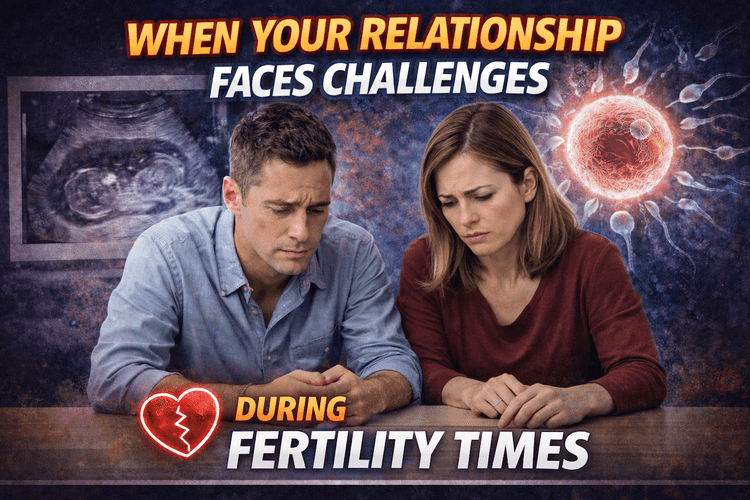What Is Sperm DNA Fragmentation and Why It Matters for Male Fertility?

Mona Bungum
Article
10 min

Discover how sperm DNA damage impacts natural conception, IVF success, and male infertility. Expert insights and fertility testing guidance.
Fertility depends on more than just sperm count or motility. While traditional semen analysis evaluates how sperm look and move, it doesn’t measure their genetic health. This is where sperm DNA fragmentation testing for male infertility comes in, it provides a deeper look into the quality of the genetic material inside each sperm cell.
Quick answer: Sperm DNA fragmentation refers to breaks or damage in the genetic material carried by sperm. This damage can lower fertility, affect embryo development, and reduce the chances of success with treatments such as IVF or ICSI.
The sperm DNA fragmentation test is increasingly recognized as an essential tool in diagnosing unexplained infertility, recurrent pregnancy loss, and failed IVF cycles. Understanding what sperm DNA fragmentation is and how it affects fertility can help men take a more informed and proactive role in their reproductive health.
By identifying the effects of sperm DNA damage on fertility, couples and clinicians can make better treatment choices, whether that means lifestyle changes, antioxidant therapy, or selecting advanced procedures such as ICSI. Knowing how to reduce sperm DNA fragmentation can significantly improve the chances of achieving a healthy pregnancy.
A Missing Piece in Fertility Workups
Despite solid research, sperm DNA fragmentation analysis is very seldom performed in clinical fertility practice. Most fertility evaluations still rely exclusively on the World Health Organization (WHO) semen parameters, sperm count, motility, and morphology.
The problem is that these parameters say nothing about the genetic integrity of the sperm cell. And here lies a hidden cause of infertility.
Around 20% of men with normal semen quality according to WHO criteria actually have a DNA Fragmentation Index (DFI) above 30%. In practical terms, this means they cannot achieve a spontaneous pregnancy or success via intrauterine insemination (IUI), regardless of how normal their other semen parameters appear.
This group is at risk of being misclassified as “fertile” in standard semen analysis, leading to unnecessary delays, repeated failed fertility treatments, and emotional strain for couples.
Learning about sperm quality vs quantity can help clarify why a normal semen volume doesn’t always guarantee fertility.
What Is DNA Fragmentation?
Sperm DNA fragmentation refers to breaks or structural damage in the DNA carried by sperm. A sperm cell may look perfectly normal under a microscope and swim actively, yet its DNA can be damaged.
Since sperm DNA contributes half the genetic blueprint for creating a child, damage in this blueprint can compromise embryo development and pregnancy outcomes, even when all other semen parameters appear normal.
This understanding has made the sperm DNA fragmentation test a key focus in modern male fertility research.
Why Does It Matter?
High sperm DNA fragmentation has been consistently associated with:
- Lower fertilization and implantation rates
- Poorer outcomes in assisted reproductive technologies (ART)
- Increased risk of miscarriage
Evidence from Bungum et al. (2004, 2007, 2011) shows that when the DFI exceeds 30% (measured by the Sperm Chromatin Structure Assay, SCSA), the chance of achieving pregnancy naturally or through IUI is essentially negligible.
The effects of sperm DNA damage on fertility extend beyond conception. Poor sperm DNA integrity can impair embryo quality, leading to early pregnancy loss or reduced implantation success.
Impact on Assisted Reproductive Technology (ART): IVF and ICSI
Bungum’s studies provided clear clinical thresholds:
- DFI <30% → Natural conception, IUI, and IVF are all possible.
- DFI >30% → IVF outcomes are poor, and spontaneous pregnancy or IUI is highly unlikely.
- ICSI (Intracytoplasmic Sperm Injection) → More effective than IVF in high-DFI cases, as it bypasses some barriers caused by DNA damage, though miscarriage risk remains elevated compared to low-DFI couples.
So, does sperm DNA fragmentation affect IVF success? Yes. High DFI significantly lowers the odds of fertilization and embryo development through conventional IVF, while ICSI offers better but still imperfect results.
Couples considering IVF can benefit from understanding how to become a parent with fertility treatment, where sperm quality testing plays an essential role in treatment planning.
Beyond Fertility: Implications for Offspring and Future Generations
Sperm DNA fragmentation is not just a barrier to conception; it may also influence the health of children and future generations.
- Embryo viability: DNA-damaged sperm can fertilize an egg, but embryos often fail to develop properly, leading to early miscarriage.
- Offspring health: High paternal DNA damage has been linked to congenital malformations, neurodevelopmental disorders, and an increased risk of certain childhood diseases.
- Transgenerational effects: Epigenetic errors introduced by damaged sperm DNA may affect not only immediate offspring but also descendants, influencing fertility and health across generations.
For couples planning conception later in life, exploring male fertility and age can provide perspective on how DNA integrity changes over time.
How Is DNA Fragmentation Assessed?
Several diagnostic methods are available, though not yet widely adopted in routine practice:
- SCSA (Sperm Chromatin Structure Assay): The method used in Bungum’s research, providing a quantitative DFI value.
- TUNEL assay: Labels DNA strand breaks with fluorescent markers for direct measurement.
- Comet assay: Visualizes DNA fragmentation as a “comet tail” under electrophoresis.
These tests provide critical insights that standard semen analysis cannot reveal. Many clinics now include sperm DNA fragmentation testing for male infertility when routine semen results appear normal but conception remains difficult.
Can DNA Fragmentation Be Reduced?
Yes, several strategies can help lower sperm DNA fragmentation and improve outcomes:
- Lifestyle modifications: quitting smoking, reducing alcohol, optimizing diet, and lowering stress.
- Antioxidant therapy: supplementation with vitamins C, E, zinc, selenium, and coenzyme Q10.
- Varicocele repair: surgery can improve sperm DNA quality in selected men.
- Advanced ART techniques: sperm selection methods such as IMSI or magnetic-activated sorting can help isolate sperm with less DNA damage.
For practical guidance on how to reduce sperm DNA fragmentation, incorporating healthy nutrition and lifestyle changes can make a measurable difference.
Conclusion
Sperm DNA analysis is rarely performed, yet it provides crucial information for diagnosing and treating infertility. The pioneering work of Bungum et al. (2004, 2007, 2011) established that:
- DFI >30% rules out natural conception and IUI success.
- ICSI is more effective than IVF when sperm DNA fragmentation is high.
- 20% of men with normal WHO semen parameters still have high DNA fragmentation, making this a hidden infertility factor.
- High fragmentation not only impacts conception but may also compromise the health of offspring and future generations.
Including sperm DNA fragmentation testing in fertility assessments helps clinicians personalize treatment, reduce repeated failures, and improve the likelihood of achieving a healthy pregnancy.
At Conceivio, we believe fertility care should combine advanced diagnostics with compassion and education. Our app connects patients to fertility experts and offers insights on testing, treatment options, and next steps.
Download the Conceivio App to explore fertility insights, track your progress, and access trusted information designed to support your path to parenthood.
References:
- Bungum, M., Humaidan, P., Spano, M., Jepson, K., Bungum, L., & Giwercman, A. (2004). The predictive value of sperm chromatin structure assay (SCSA) parameters for the outcome of intrauterine insemination, IVF and ICSI. Human Reproduction, 19(6), 1401–1408. https://doi.org/10.1093/humrep/deh280
- Bungum, M., Humaidan, P., Axmon, A., Spano, M., Bungum, L., Erenpreiss, J., & Giwercman, A. (2007). Sperm DNA integrity assessment in prediction of assisted reproduction technology outcome. Human Reproduction, 22(1), 174–179. https://doi.org/10.1093/humrep/del326
- Bungum, M., Bungum, L., & Giwercman, A. (2011). Sperm chromatin structure assay (SCSA): A tool in diagnosis and treatment of infertility. Asian Journal of Andrology, 13(1), 69–75. https://doi.org/10.1038/aja.2010.73


















